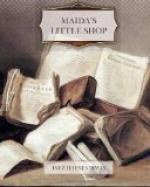“Good morning, Petronilla,” he said pleasantly, as if he had not seen her before that morning, “How’s business?”
“Fine!” Maida responded promptly. “I’ve just sold ten fairy books to the funniest little boy you ever saw.”
“My stars and garters!” Billy exclaimed. “Business surely is brisk. Keep that up and you can afford to have a cat. I’ve brought you something.”
He opened the bag he carried and took a box out from it. “Hold out your two hands,—it’s heavy,” he warned.
In spite of his preparation, the box nearly fell to the floor—it was so much heavier than Maida expected. “What can be in it?” she cried excitedly. She pulled the cover off—then murmured a little “oh!” of delight.
The box was full—cram-jam full—of pennies; pennies so new that they looked like gold—pennies so many that they looked like a fortune.
“Gracious, what pretty money!” Maida exclaimed. “There must be a million here.”
“Five hundred,” Billy corrected her.
He put some tiny cylindrical rolls of paper on the counter. Maida handled them curiously—they, too, were heavy.
“Open them,” Billy commanded.
Maida pulled the papers away from the tops. Bright new dimes fell out of one, bright new nickels came from the other.
“Oh, I’m so glad to have nice clean money,” Maida said in a satisfied tone. She emptied the money drawer and filled its pockets with the shining coins. “It was very kind of you to think of it, Billy. I know it will please the children.” The thought made her eyes sparkle.
The bell rang again. Billy went out to talk with Granny, leaving Maida alone to cope with her first strange customer.
Again her heart began to jump into her throat. Her mouth felt dry on the inside. She watched the door, fascinated.
On the threshold two little girls were standing. They were exactly of the same size, they were dressed in exactly the same way, their faces were as alike as two peas in a pod. Maida saw at once that they were twins. They had little round, chubby bodies, bulging out of red sweaters; little round, chubby faces, emerging from tall, peaky, red-worsted caps. They had big round eyes as expressionless as glass beads and big round golden curls as stiff as candles. They stared so hard at Maida that she began to wonder nervously if her face were dirty.
“Come in, little girls,” she called.
The little girls pattered over to the show case and looked in. But their big round eyes, instead of examining the candy, kept peering up through the glass top at Maida. And Maida kept peering down through it at them.
“I want to buy some candy for a cent,” one of them whispered in a timid little voice.
“I want to buy some candy for a cent, too,” the other whispered in a voice, even more timid.
“All the cent candy is in this case,” Maida explained, smiling.




